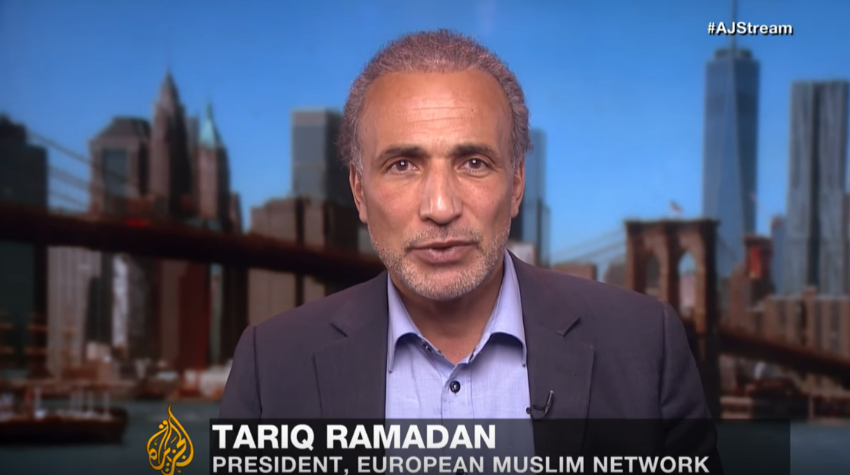As far as the US State Department and the Department of Homeland Security are concerned, Islamic scholar and academic Tariq Ramadan helps terrorists – he gave ¤900 (HK$9,000) to two groups with links to Hamas – and is deemed “a national security threat”, although they won’t say why. That cost the occasional guest of former president Bill Clinton a tenured position in 2004 at the University of Notre Dame. Ramadan, who now teaches at Oxford University, is a controversial figure. In Europe, one critic studied his writings and determined him to be “a war leader” echoing the views of his grandfather, founder of the Muslim Brotherhood. Others say he’s a fascist and an anti-Semite. Swiss-born Ramadan, 44, who many consider to be an influential and moderate voice in Islam with particular appeal to young Muslims in Europe, has written a new book that will probably upset a lot of people. The Messenger: The Meanings of the Life of Muhammad is a concise overview of the life of the Prophet, his role as Messenger of God in receiving the Koran, and the example he set for a Muslim community that expanded from a handful of followers in 622 to encompass the entire Arabian peninsula within eight years. Centuries after the Prophet’s death in 632, Islam had made itself felt worldwide and today is experiencing a reawakening. Ramadan is a devout Muslim, but there’s no proselytising here, nor does he challenge the various interpretations of the Koran that divide Sunni and Shiite. The Messenger offers examples of what God told the Prophet and how he tried, not always successfully, to make his life an example of God’s teachings. “I am but a man like yourselves; the inspiration has come to me that your God is one God,” the Prophet replied when asked for miracles to prove that he was the Messenger. Born in 570 into a noble Mecca family, the Prophet but was an orphan by the age of six and raised by an uncle, who sent him to live among the Bedouins for several years, as was customary. He spoke from experience in one of his hadith: “Be in this world as if you were a stranger or a wayfarer.” As he meditated on the nature of things in a small cave, he was visited one night in 610 by the Angel Gabriel. He was initially frightened to discover that he was the Messenger of God and the last prophet in a line extending back through Jesus and Moses to Abraham, recognised today as the patriarchs of the three great monotheistic religions. The Messenger is filled with ideas that Jews and Christians will find familiar. The Koran acknowledges the Torah given to Moses and the teachings of Jesus Christ. Indeed, the Prophet confirmed God had spoken to the Jews through Moses and the Christians through Jesus and the apostles. But Judaism had corrupted the Scriptures, and Christians worshipped Jesus as the son of God, despite being told to worship none other than God. It was the Prophet’s task to restore the right path. Islam is about the absolute acceptance of God’s will. Ramadan draws on the many biographers of the Prophet to outline significant points in his life, and claims no new scholarship. His approach is to look at how the Prophet communicated the Revelations and conveyed what was essentially a revolutionary code of behaviour based on justice, kindness, forgiveness and charity, but mostly respect for others and for nature, “the primary guide and the intimate companion of faith”. “Cut off from nature in our towns and cities, we nowadays seem to have forgotten the meaning of this message to such an extent that we dangerously invert the order of requirements and believe that learning about the techniques and forms of religion (prayers, pilgrimages, etc) is sufficient to grasp and understand their meaning and objectives,” Ramadan writes. “This delusion has serious consequences since it leads to draining religious teaching of its spiritual substance, which actually ought to be its heart.” The Prophet received and recorded God’s message during a period of 23 years until the Koran was complete. It is considered the earliest and finest work of classical Arabic prose. Ramadan says the meaning of the Prophet’s life involves “turning away from the idols of one’s time (power, money, the cult of appearances, etc); emigrating from lies and unethical ways of life; liberating oneself, through the experience of breaking away, from all the appearances of freedom paradoxically reinforced by our habits”. In his wide-ranging review of Islam’s origins, Ramadan pauses to discuss issues of contemporary interest, such as the nature of jihad, which is about personal struggle but was extended as events required by the Prophet to include al-qital – “necessary armed resistance in the face of armed aggression”. Of women, Ramadan says the Prophet “guided them to assert themselves, be present, express themselves, and claim the real freedom of heart and conscience”, but they had to “choose for themselves and trace it out for themselves”. Perhaps it is not Ramadan’s alleged “terrorist” associations that worry the Americans, but the growing appreciation of Islam that has been emerging since the attacks of September 11,2001. Then again, perhaps he is a terrorist – one armed with ideas, not explosives.



![PALEXPO : Democratic Engagement & Justice for Palestinians [08/07/2017]](https://tariqramadan.com/english/wp-content/uploads/sites/9/2017/07/Palexpo.png)
![Bristol Festival of Ideas : Conversation with Julian Baggini [24/05/2017]](https://tariqramadan.com/english/wp-content/uploads/sites/9/2017/06/bristol.png)
![Interview on BBC Radio Ulster [06/06/2017]](https://tariqramadan.com/english/wp-content/uploads/sites/9/2017/06/p03nnqlv.jpg)
![Interview on BBC 4 : What do the London attacks have to do with Islam? What is the Muslims’ responsibility?[06/06/2017]](https://tariqramadan.com/english/wp-content/uploads/sites/9/2017/06/bbc.jpg)

